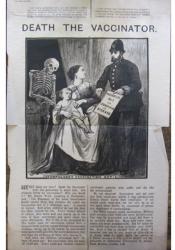The Vaccination Act of 1853
The Vaccination Act of 1853 was a law that was passed in England in response to the overwhelming smallpox epidemic. Smallpox was one of the most common causes of death in Britain at the time and had a mortality rate of 30%. Those who survived were often blinded and/or scarred (Victorian Health Reform). This act was a part of a series of laws to make vaccinations mandatory for the public. The 1853 act made it compulsory for all children to be vaccinated within the first three months of their lives to protect them against smallpox (Wolfe and Sharp). If the parents of these children refused to comply with the law, they were subject to pay a fine and could even spend time in jail.
Immediately after the passing of the 1853 law, resistance to vaccinations began among the public. Violent riots occurred in Mitford, Ipswich, Henley, and various other towns (Wolfe and Sharp). That same year an anti-vaccination group, the Anti-Vaccination Leauge, was founded in London and provided an outlet for those who were opposed to the new laws. There were many reasons why people were opposed to receiving mandatory vaccinations. Many people were afraid that the vaccines were unsafe and felt that they were unnecessary. Others found the fact that the vaccines were compulsory to be a major government interference (Victorian Health Reform). While not everyone was against the thought of these new vaccinations, those who were opposed were much more vocal and aggressive about their dissent. To truly understand the role of science in society at the time, it is important to be aware of the range of views that the public held on this topic.
Victorian Health Reform. (n.d.). The National Archives. Retrieved November 1, 2020, from
https://www.nationalarchives.gov.uk/education/resources/victorian-health-reform/
Wolfe, R. M., & Sharp, L. K. (n.d.). Anti-Vaccinationists Past and Present. NCBI. Retrieved
November 1, 2020, from

